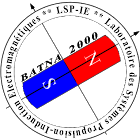, “Analysis and Design of rotor MRAS Speed Sensorless with a Novel Approach,” the 17th International conference on Sciences and Techniques of Automatic control & computer engineering, STA'2016. 2016.
Équipe 04
, “Flux Observers Design for Induction Motor using Linear Parameter Varying Observer and Sliding Mode Observer,” the 17th International conference on Sciences and Techniques of Automatic control & computer engineering, STA'2016. 2016.
, “Nonlinear Control of the Doubly Fed Induction Generator used with Wind Turbine for an Isolated Grid,” 17th International conference on Sciences and Techniques of Automatic control & computer engineering , STA'2016. 2016.
, “Samir BOUSLIMANI, Said DRID and L. CHRIFI ALAOUI, Pascal Bussy and Mohamed “Inter-Turn Faults Detection using Park Vector Strategy,” the 17th International conference on Sciences and Techniques of Automatic control & computer engineering,STA'2016. 2016.
, “dSPACE Real-Time Implementation of Maximum Power Point Tracking Based on Ripple Correlation Control (RCC) Structure for Photovoltaic System,” 5th International Conference on Systems and Control, Cadi Ayyad University, 2016.
, “Electromagnetic, flow and thermal coupling in a MHD pump taking account the saturation of the ferromagnetic material,” Eleventh International Conference on Ecological Vehicles and Renewable Energies (EVER’16)EVER’2016. 2016.Abstract
, “Sliding Mode Control of Grid Connected Brushless Doubly fed Induction Generator driven by Wind Turbine in Variable Speed,” International Journal of Systems Assurance Engineering and Management, 2016.
, “Optimal energy control of a PV-fuel cell hybrid system,” International Journal of Hydrogen Energy, 2016.
, “Robust Direct Power Control based on the Lyapunov theory of a grid-connected Brushless doubly fed induction generator,” ournal Frontiers in Energy, Springer, vol. 10 N°3, pp. 298-307, 2016.Abstract
, “Fuzzy speed estimation in case of sensorless induction machine vector control ,” Turkish Journal of Electrical Engineering & Computer Sciences, vol. 24, pp. 3961–3975, 2016.
, “Robust Nonlinear Control of a Mobile Robot,” Journal of Electrical Engineering & Technology , vol. 11, No.4, 2016.
, “Second Order Sliding Mode Control of DC-DC converter used in the Photovoltaic System according an Adaptive MPPT,” Journal of Renewable Energy Research, vol. 6, No.2, 2016.
, “A Developed energy management strategy for a stand-alone hybrid power system for medium rural health building,” the International Transactions on Electrical Energy Systems, vol. 26, N°. 4, pp. 713–729, 2016.
, “Modified speed sensorless indirect field-oriented of induction motor drive,” International Journal of Modelling, Identification and Control journal, vol. 21 No. 4, pp. 370-377, 2016.
, “A new flux rotor based MRAS for sensorless control of induction motor,” 5th International Conference on Systems and Control (ICSC), Marrakesh, Morocco. pp. 365-370, 2016.Abstract
